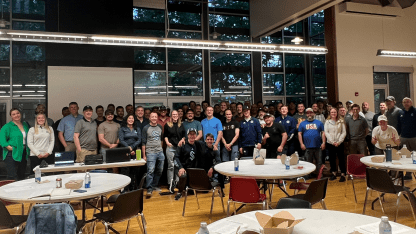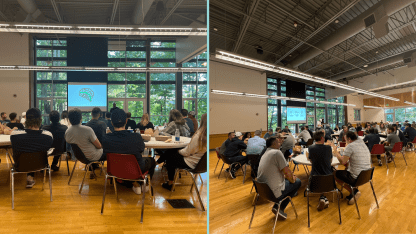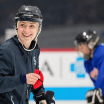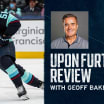In early September, more than 60 part-time and volunteer coaches with the Kraken Youth Hockey Association gathered at the Northgate Community Center across the street from the NHL team’s training center. The topic for the 90-minute evening session, wonderfully, was “Healing-Centered Coaching and Inclusive Coaching Strategies.”
The night was right on target for the Kraken Youth Hockey Association's mission to “create a fun, positive and inclusive space that offers access to the ice, cutting-edge curriculum, and impactful coaching.” Plus, equally a perfect fit for “creating access and opportunities to youth so everyone who wants to play, can play,” one of the three pillars of action for One Roof Foundation, the philanthropic arm of the Kraken and Climate Pledge Arena.
That such a session attracted those 60-plus coaches is a testament to the grown-ups who attended—and the Kraken staff deeply involved in youth hockey and the social impact endeavors of One Roof. Better yet, the coaching volunteers came prepared and eager to use their time to both learn and teach.
Adrienne Moore, director of movement building for the Center for Healing and Justice through Sport (CHJS) was co-leader for the night. She was quickly impressed with the coaches group as she dug into the topic of how kids’ brains process stress and how trust is an antidote and why “patterned repetitive rhythmic activity” (in hockey’s case, one example is the sound of pucks on sticks) is a direct route to transforming sport into a healing medium.
The idea that sport can teach and heal “and not harm is something most coaches understand,” says Moore, who played softball for Western Washington University before embarking on a career that blends the principles of youth cognitive development and sports.
“They get into coaching youth sports because they think that way,” says Moore when asked about audience intention and participation in September’s training. “Because there is not enough coaching education out there so when people get concepts or strategies that really resonate with that philosophy, they lean forward in their chairs.
“There were lots of questions, lots of feedback, and what we [Chris Reed, CHJS lead consultant was co-presenter] love to see is the room talking to each other. We pose a question or a concept and a coach would ask a question and we’d hear lots of wisdom in the room that's not just us at the front. So coaches are sort of brainstorming back and forth: 'Here's what I do that works.’ It was really hockey-specific and really specific to the context of One Roof. That’s top-tier stuff for us.”
Moore will facilitate a “makeup” virtual session for Kraken youth hockey coaches on Nov. 13.
She will start the session the same as she does for coaches at all levels of sport from the Chicago Bulls to parks and recreation leagues throughout the country - with a short look at how our brains, specifically those of young people, react to stress - and what coaches can do to counteract the chaos that can be inside the mind of young athletes trying to fit in and perform and, yes, always the end game, have fun.
“Folks enjoyed that foundation [of the physiology of stress] and understood what it looks like when a young person's stressed out and not able to do what the coaches are asking,” says Moore. “It was helpful for people to be able to assign some biology to what's going on there and then understand how to think a little bit differently in those moments, which are usually pretty challenging.”




















